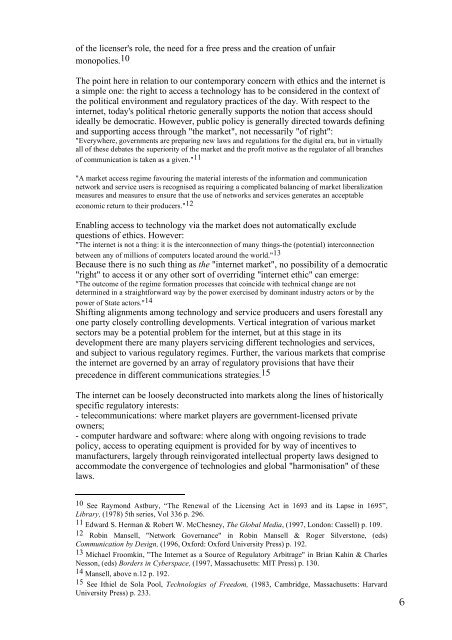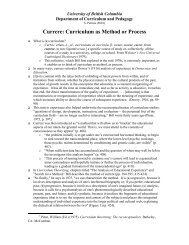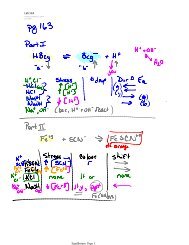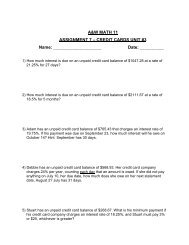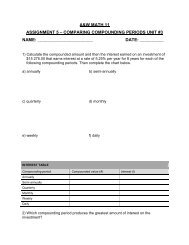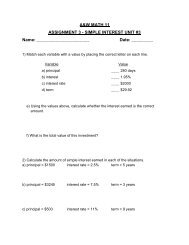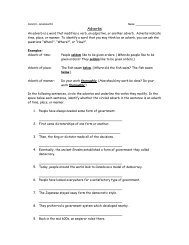ETHICAL BOUNDARIES AND INTERNET CULTURES
ETHICAL BOUNDARIES AND INTERNET CULTURES
ETHICAL BOUNDARIES AND INTERNET CULTURES
Create successful ePaper yourself
Turn your PDF publications into a flip-book with our unique Google optimized e-Paper software.
of the licenser's role, the need for a free press and the creation of unfair<br />
monopolies. 10<br />
The point here in relation to our contemporary concern with ethics and the internet is<br />
a simple one: the right to access a technology has to be considered in the context of<br />
the political environment and regulatory practices of the day. With respect to the<br />
internet, today's political rhetoric generally supports the notion that access should<br />
ideally be democratic. However, public policy is generally directed towards defining<br />
and supporting access through "the market", not necessarily "of right":<br />
"Everywhere, governments are preparing new laws and regulations for the digital era, but in virtually<br />
all of these debates the superiority of the market and the profit motive as the regulator of all branches<br />
of communication is taken as a given." 11<br />
"A market access regime favouring the material interests of the information and communication<br />
network and service users is recognised as requiring a complicated balancing of market liberalization<br />
measures and measures to ensure that the use of networks and services generates an acceptable<br />
economic return to their producers." 12<br />
Enabling access to technology via the market does not automatically exclude<br />
questions of ethics. However:<br />
"The internet is not a thing: it is the interconnection of many things-the (potential) interconnection<br />
between any of millions of computers located around the world." 13<br />
Because there is no such thing as the "internet market", no possibility of a democratic<br />
"right" to access it or any other sort of overriding "internet ethic" can emerge:<br />
"The outcome of the regime formation processes that coincide with technical change are not<br />
determined in a straightforward way by the power exercised by dominant industry actors or by the<br />
power of State actors." 14<br />
Shifting alignments among technology and service producers and users forestall any<br />
one party closely controlling developments. Vertical integration of various market<br />
sectors may be a potential problem for the internet, but at this stage in its<br />
development there are many players servicing different technologies and services,<br />
and subject to various regulatory regimes. Further, the various markets that comprise<br />
the internet are governed by an array of regulatory provisions that have their<br />
precedence in different communications strategies. 15<br />
The internet can be loosely deconstructed into markets along the lines of historically<br />
specific regulatory interests:<br />
- telecommunications: where market players are government-licensed private<br />
owners;<br />
- computer hardware and software: where along with ongoing revisions to trade<br />
policy, access to operating equipment is provided for by way of incentives to<br />
manufacturers, largely through reinvigorated intellectual property laws designed to<br />
accommodate the convergence of technologies and global "harmonisation" of these<br />
laws.<br />
10 See Raymond Astbury, “The Renewal of the Licensing Act in 1693 and its Lapse in 1695”,<br />
Library, (1978) 5th series, Vol 336 p. 296.<br />
11 Edward S. Herman & Robert W. McChesney, The Global Media, (1997, London: Cassell) p. 109.<br />
12 Robin Mansell, "Network Governance" in Robin Mansell & Roger Silverstone, (eds)<br />
Communication by Design, (1996, Oxford: Oxford University Press) p. 192.<br />
13 Michael Froomkin, "The Internet as a Source of Regulatory Arbitrage" in Brian Kahin & Charles<br />
Nesson, (eds) Borders in Cyberspace, (1997, Massachusetts: MIT Press) p. 130.<br />
14 Mansell, above n.12 p. 192.<br />
15 See Ithiel de Sola Pool, Technologies of Freedom, (1983, Cambridge, Massachusetts: Harvard<br />
University Press) p. 233.<br />
6


